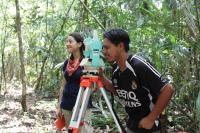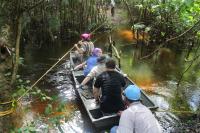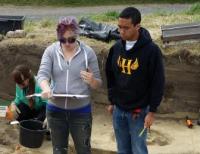Anthropology Programs
Anthropology is a holistic science dedicated to the study of human biological and cultural diversity and evolution. Anthropologists integrate methods and theories from across the sciences, arts, and humanities to gain a deep understanding of how people live in and respond to their environments. It includes four intersecting fields: archaeology, biological anthropology, sociocultural anthropology, and linguistic anthropology (read more about the subfields...)
Anthropology programs at Cal Poly Humboldt are:
 The Bachelor of Science in Anthropology includes concentration options in each subfield: archaeology, biological anthropology, linguistic anthropology, and sociocultural anthropology (read more about the subfields). Starting Fall 2024, a "cross-disciplinary" concentration is available for student's whose primary interests cross multiple subfields. |
 The Master of Arts in Applied Anthropology at Cal Poly Humboldt is a flexible degree program focused on building competitive, marketable skills for the application of anthropological perspectives, methods, and theories, and practices in a diverse array of careers in academic, professional, and global contexts. |
 The Minor in Anthropology allows students to explore anthropology, including its subfields. The minor can be completed with courses that also count for general education requirements. |
 The Maritime Archaeology Certificate provides background information and foundational knowledge in maritime history and archaeology. The certificate will help prepare for graduate education in this field. Upon completion, students will have diving qualifications and basic maritime archaeological skills to assist in maritime archaeological projects. |
 The Minor in Sustainable Food Systems is an interdisciplinary minor that provides students with a holistic food systems perspective, ideal for pursuing food system related careers and graduate programs. The minor includes pathways for completion across disciplines. |
 The Belize Archaeology Field School involves field survey, excavation at several Maya sites, and laboratory experience working directly with excavated Maya artifacts. Field techniques, lectures on Maya culture history and instruction concerning artifact analysis are provided. |
 The Medieval Bioarchaeology Field Program in Żelewo, Poland is a summer field school run jointly by faculty from the University of Szczecin in Poland and other institutions in the US and Poland. The program is run in cooperation with the Slavia Foundation. It is a unique opportunity to excavate and analyze medieval remains as part of a salvage archaeological project due to intensive agriculture and natural processes in the region. |
